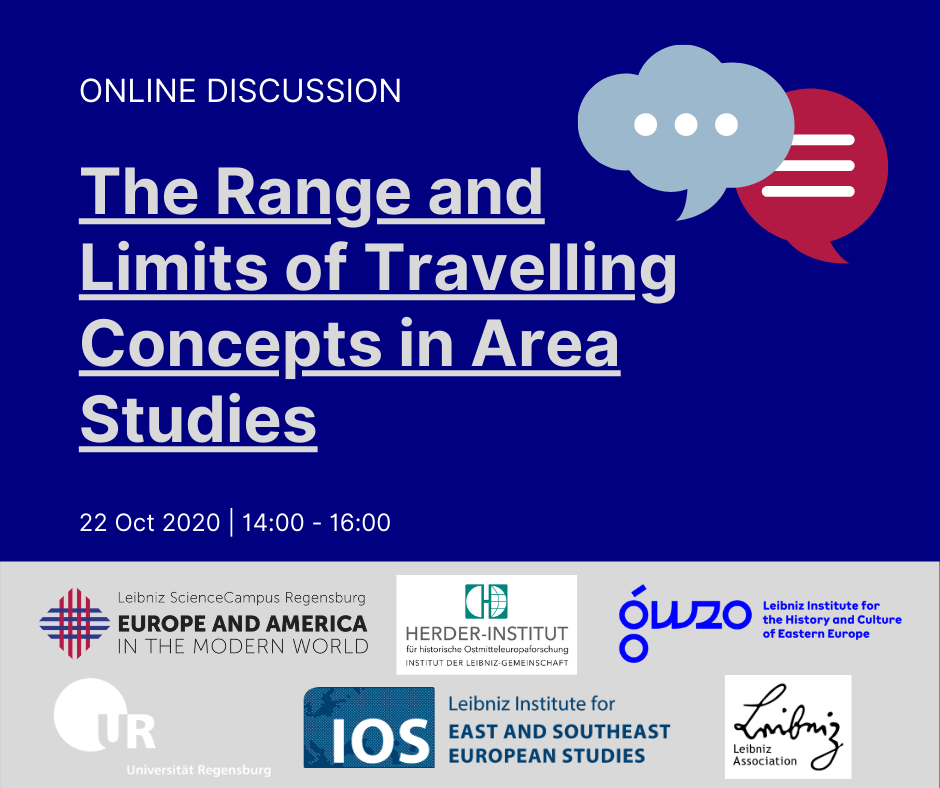The Range and Limits of Travelling Concepts in Area Studies - Online Discussion
On Thursday 22 October, from 14:00-16:00, the Leibniz-ScienceCampus "Europa and America" in Regensburg, the Herder Institute Research Academy in Marburg, and the Leibniz Institute for the History and Culture of Eastern Europe (GWZO) are holding an online discussion on "The Range and Limits of Travelling Concepts in Area Studies". You are warmly invited to join the event via Zoom: https://uni-regensburg.zoom.us/j/82404482367.
Access via Zoom: https://uni-regensburg.zoom.us/j/82404482367.
Access to readings: please contact campus@europeamerica.de
The Range and Limits of Travelling Concepts in Area Studies - Online Discussion
In this online meeting, doctoral researchers, postdocs and faculty in Leipzig, Marburg and Regensburg will discuss the significance and applicability of travelling concepts for area studies. As Mieke Bal suggests, concepts do offer a foundation for scholarly discussion across the humanities and social sciences, but they are not epistemically neutral analytical tools. They are shaped both by their origins in certain disciplines, periods and geographical or institutions spaces and by their encounters with other disciplines, discourses and spaces as they travel. The discussion seeks to address this intersection of ‘roots’ and ‘routes’, to use James Clifford’s distinction (Clifford 1997), in the emergence of increasingly salient travelling concepts following area studies’ recent ‘rebirth’ (Multinovic, ed. 2019). How do concepts travel across disciplinary and regional boundaries? Do they move smoothly or face restrictions? Does area studies facilitate a productive translation of concepts or does it still perhaps reproduce epistemic asymmetries that have traditionally shaped the field as the sites of production of analytical theories and empirical data have often differed?
We propose to open the session with a discussion of two key texts addressing the place of travelling concepts in the humanities and social sciences. In the second part, colleagues will give short talks on particular travelling concepts drawng from their ongoing research that explores the potential for crossing regional and disciplinary boundaries.
The discussion of the two texts will be led by Dr. Anna-Veronika Wendland (Herder-Institut, Marburg).
The following themes and travelling concepts will be discussed by colleagues currently based in Marburg, Leipzig and Regensburg:
- Hana Rydza (GWZO, Leipzig) - Populism
- Agustín Cosovschi (visiting fellow at IOS Regensburg) - Self-management as a travelling concept between Latin America and Yugoslavia
- Carmen Dexl (Universität Regensburg) - Infrastructures and Performance
- Tatsiana Astrouskaya (Herder Institute Research Academy, Marburg) - The Travels of the Concepts of Samizdat and Dissent
Readings
Frank Bösch and Hubertus Büschel, 'Transnational and Global Perspectives as Travelling Concepts in the Study of Culture' in Travelling Concepts for the Study of Culture, Neumann and Nünning, eds. Berlin: De Gruyter, 2012, pp. 371-388. www.degruyter.com/view/title/36914
Boris Buden, ‘Translation and the East There is No Such Thing as an “Eastern European Study of Culture”’, in The Trans/National Study of Culture: A Translational Perspective, Bachmann-Medick, Doris, ed., Berlin: De Gruyter, 2014, pp. 171-180. www.degruyter.com/view/title/304513
Organisers
Tatsiana Astrouskaya (Herder Institute, Marburg) - tatsiana.astrouskaya@herder-institut.de
Corinne Geering (GWZO, Leipzig) - corinne.geering@leibniz-gwzo.de
Paul Vickers (Leibniz ScienceCampus Europe and America, Regensburg) – paul.vickers@ur.de
References in Abstract
James Clifford, Routes: Travel and Translation in the Late Twentieth Century (Cambridge, MA: Harvard UP, 1997).
Zoran Milutinovic, ed., The Rebirth of Area Studies: Challenges for History, Politics and International Relations in the 21st Century (London: Bloomsbury, 2019).

